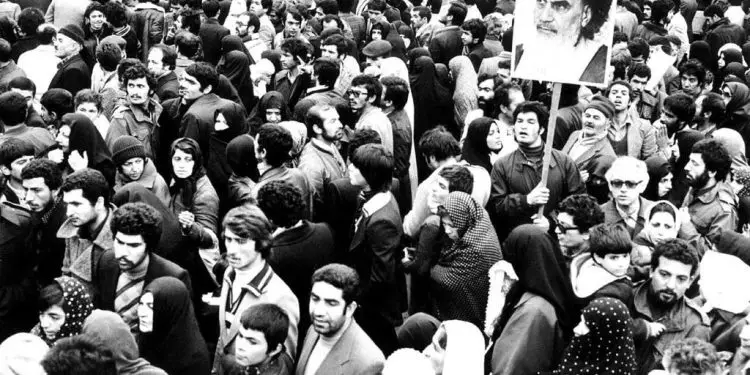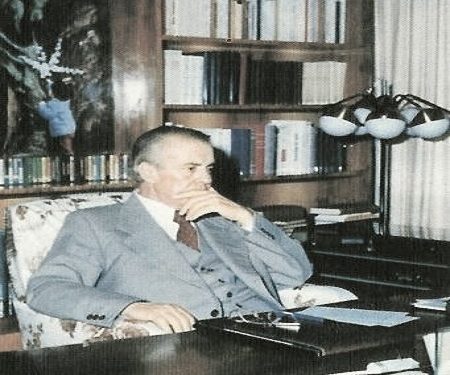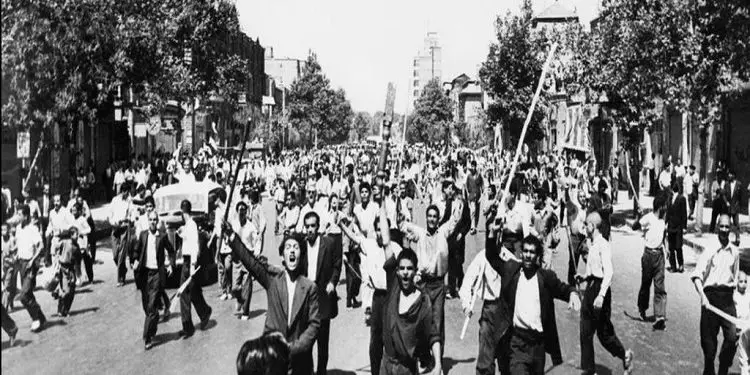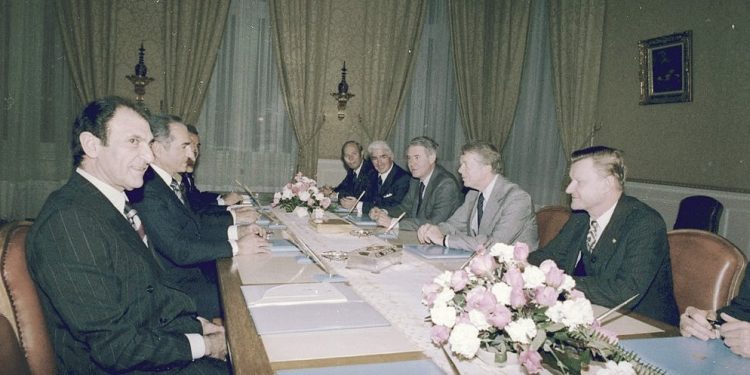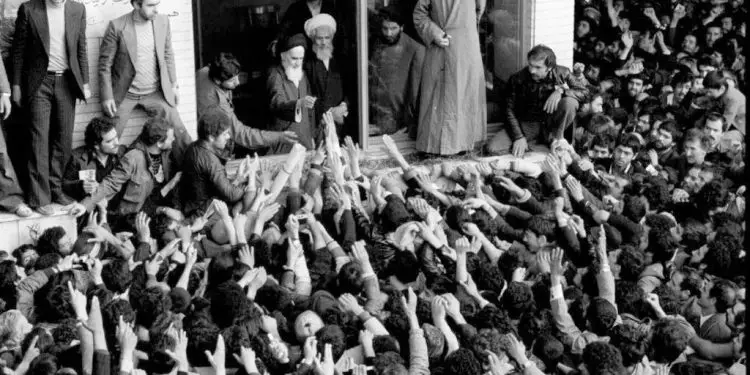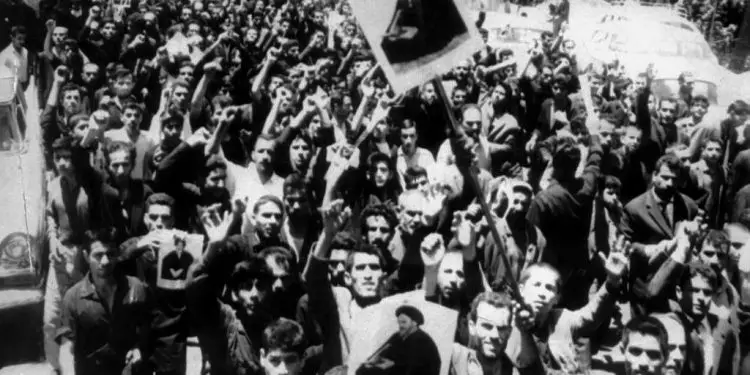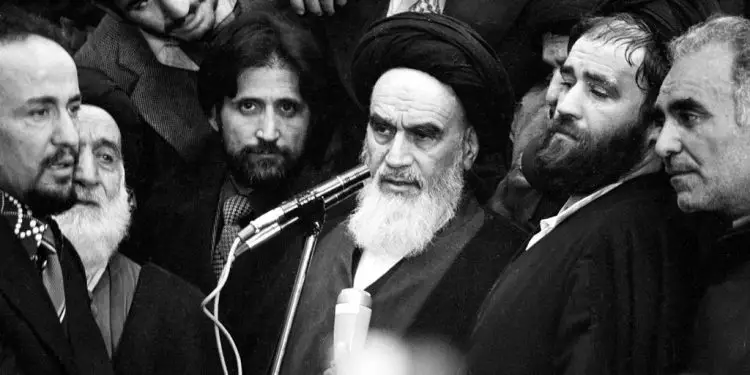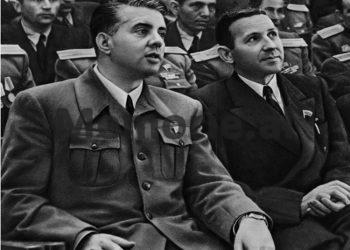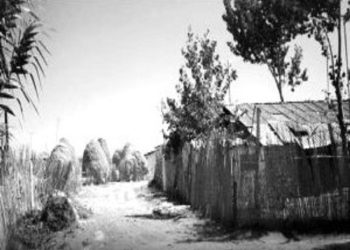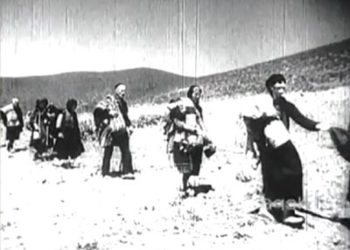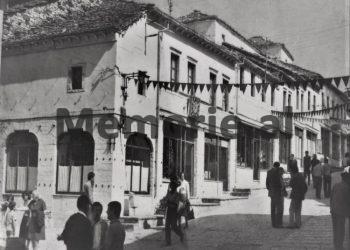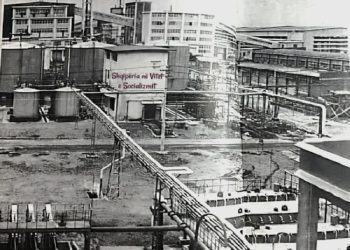By Dashnor Kaloçi
The third part
Memorie.al publishes some archival documents extracted from the Central State Archive in Tirana, where the personal fund of the former first secretary of the PPSh Central Committee is located, from which we have extracted some parts from his political diary that belongs to a period of time from the beginning of January 1979 to February 1982, where the focus of his notes are the events developed in Iran, where the Islamic insurgent forces led and inspired by Ayatollah Kohmeini who managed to dethrone Shah Reza Phalevi, who, having the full support of the United States of America, was forced to leave the country by plane, arriving first in Cairo, where he was received as a personal friend by President Janwar Sadat and also, the former president of the United States of America, Zehrar Ford, (who was on a visit to Egypt those days), to then leave for the USA. After the overthrow and impeachment of Shah Reza Palehvi, at the end of January 1979, Ayatollah Kohmeini, the religious spiritual leader of the Shia Iranians, who was said to be leading the revolution to overthrow the Palehvi dynasty, arrived in Tehran from Paris, where he was staying for years. How he described all those events in his political diary, the leader of communist Albania, the dictator Enver Hoxha, who, among other things, says: “Shahu, to protect himself from the people, had bought from the United States of America , a large amount of the most modern weapons that they have sold abroad, he had created an army of hundreds of thousands of people, with all kinds of weapons, with airplanes, with tanks, with machine guns, with missiles of the most modern, he had built many airfields . All this was done to protect the assets of the Americans in Iran and the assets of the Shah, as well as to keep the people in misery. Of course, such a state could not continue throughout his life, although material military and political aid to the Shah came from all four corners of the world. In addition to others, even the new Chinese empire threw roses at the Shah. Hua Kuo Fen himself, went to Iran and with the greatest cordiality, talked about a: “great and healthy friendship”, with the Shah of Persia and wished long life to this powerful supplier of oil, great friends of China , the United States of America and world capitalism”.
Continues from last issue
The political diary of Enver Hoxha
TUESDAY FEBRUARY 13, 1979
THE REVOLUTION OF THE IRANIAN PEOPLE TRIUMPHED
It should be recognized that among the instructions given there, there are also some that are right, for example, those that say that the enemy elements of the Iranian people must be liquidated. In addition to others, revolutionaries, Marxist-Leninists; progressive elements of different classes, must break away from the chains of religion and ideology and religious teaching, must free, in the first place, the woman from Islamic slavery, disappear the sheets, women’s parts and reveal to them face. The woman is put to work, in factories and everywhere. In Iran, in this country where the medieval religious fascist and imperialist regime has ruled until these days, women make up half of the population and, as everywhere, are one of the most revolutionary forces, after the proletariat.
The revolutionaries in Iran and the Marxist-Leninists, the proletariat itself, must have taken notice of the savage exploitation that American, British, French imperialism and all world capitalism has done to them, and therefore they must not allow the wealth of their country to be divided again with different quotas among these same Imperialists: Of course, Iran cannot live in isolation and cannot not produce and sell oil. It is a great asset for this country, but it is also a great nerve for the Western world, especially for world capitalism, which can go to war for Iranian oil. Iran can be a battlefield between the American state and the world state, with Soviet social imperialism, which has about two thousand kilometers of border with Iran, where many Azerbaijanis live.
The Azerbaijanis of Iran have family and tribal ties with the Azerbaijanis of the Soviet Union, therefore, it is impossible that this does not have influence in the revolution of the people of Iran, that it does not have its own people in the “Tudeh” party and in other political layers. Thus, knowing that the importance of Iran lies mainly in oil, and for oil everyone will fight, the Iranian revolutionaries must be vigilant in this matter. News agencies and influential people say and consider Iran’s oil embargo far more terrible than the Berlin embargo, than the Korean war, than the Vietnam war, it is a fact that the events in Iran, the four-month strikes of extraction workers of oil, have caused a two-year loss, if not more, of European-American capitalist industry.
Therefore this is an acute problem. In the event that the Iranians remain firm in these revolutionary positions and continue in the future with serious persistence, this action of theirs will definitely have a great influence in other countries of the Middle East. Since then, Khomeini has refused to give oil to Israel, the friend of the Americans, which used to get 75 percent of its oil from Iran, as well as to Rhodesia and the racists of South Africa. If the new government that is being formed addresses the oil problem in the interest of the Iranian people and other peoples who are suffering under the heel of the imperialists and social-imperialists, then this is a step forward for the revolution. But, of course, revolutionaries, Marxist-Leninists and the Iranian proletariat must understand that what they want cannot be done the way they want it.
The situation, today’s objective revolutionary situation, whose subjective side is dominated by the religious idealist element, must be deepened even further. This force must be gradually taken over through more progressive alliances, or by hindering it in those actions that are detrimental to the interests of the people, precisely through the great revolutionary force of the people. The Iranian people must become aware that the victory was achieved by them; it is the work of their war and not by Ayatollah Khomeini, Allah, Hazrat Ali, and Hazrat Hyserri. The Islamic inspiration of this revolution was talked about and is still being talked about and, for sure, will be talked about in the future, but decisive in it was the attack of the people and the workers, who were killed in the streets against the Shah, against the medieval-empire, against imperialism. , for a free life and an even happier future, for a true democracy, until the socialist revolution is reached.
TUESDAY FEBRUARY 13, 1979
THESIS FOR A NEW ARTICLE, ABOUT THE EVENTS IN IRAN
I spoke to my friends about the need to prepare another article about the revolution of the Iranian people, where it should be noted that this revolution, which overthrew the medieval feudal monarchy of the Shah in Iran, also dealt a heavy blow to the imperialist powers, especially American imperialism, as well as world capitalism in general, which had benefited until now, robbing the oil and exploiting the people of this country to the core. In this article, we emphasize that Lenin’s thesis that; today’s era is the era of revolutions and the dictatorship of the proletariat. Even our Party, let us point out, has said that currently the revolution is not only an aspiration, but an issue that is on the agenda, and this thesis is proven by the uprising of the Iranian people.
In the current situations of world development, this revolution will surely be followed by other revolutions, of course, with different intensities. Even the example of Iran will influence other countries, thus helping in the struggle for the liberation of all oppressed peoples. In the article, we should not deny the subjective influence of the Shiite religious sect, because it played a positive role in the overthrow of the imperial regime of the Pahlavi feudal dynasty. But, at the same time, we should emphasize that the ideology that leads this sect is idealistic, religious, therefore it can never properly realize the democratic aspirations of the secular masses of the people of Iran, which in turn outwardly he may appear to be a believer, but in his actions, and precisely in this revolution, he proved to be advanced, objective and radical.
It should be clear that the inspiration of this revolution against the feudal dynasty of Shah Muhammad Reza Pahlavi and imperialism is not simply religious and idealistic, but also has a democratic, progressive character. The popular masses showed themselves ready for important transformations, for agrarian reform, for a truly progressive cultural development, for the elimination of the backwardness of the people, of the women and girls of Iran, who, going out into the streets to fight, were they fought and got bloody with SAVAK and the imperial guard. So, it should be pointed out that these measures were not the problem of the Islamic religion, but the problem of liberating the people, the working class, the peasantry, the women and the youth of this country. It should also be emphasized what Lenin said about the revolution, that this is a serious issue, that if you get into it, you have to go to the end.
This is to draw the attention of the people of Iran to be vigilant, not to allow themselves to fall under the yoke of foreign imperialists again, be they American, Soviet or others, who will certainly intrigue and, through the compromises of of bribes, will try to corrupt the corruptible, in order to take back in other “new” forms the old concessions and positions, with great profits for themselves and with losses for the people of Iran. This, let’s emphasize in the article, should not be allowed by the Iranian people. In order to achieve this, he must overthrow the old power from the foundations and create new organs of power, prepare his new constitution, which must not have anything alienated from the so-called bourgeois democracy. In the matter of the organization of power, the Iranian people should not allow the feudal-bourgeoisie to infiltrate their institutions, but take them into their own hands, appointing their most loyal representatives to carry out major reforms and social and economic truth.
The part in which we will draw attention to how Lenin’s thesis must be understood so that the revolution can be carried to the end, we will elaborate by making it clear that the proletarian revolution cannot be carried out today and tomorrow. Progressive forces must step by step gain ground, sound democratic and progressive positions against all reactionary elements, especially against the remnants of backward feudalism of the past that will resist the revolution. It can be emphasized in the article that the Iranian people should take into account the strategic position of their country and all the tools they have in their hands to protect the victories of the revolution. Among them, oil is the strongest weapon in his hands, because it is known that whoever has the oil in Iran has the strength, so the working class should not allow anyone to snatch this powerful weapon from their hands. Throughout the Iranian revolution, especially the last four months, oil shook and continues to shake the capitalist world.
Therefore, let us emphasize that the people of Iran must become conscious to keep this weapon firmly in their hands, not to be afraid of the Americans, nor of the Soviets, nor of other coalitions, not to be afraid of isolation and to defend it resolutely this wealth. A country in revolution that has such a weapon in its hand as oil, that has such a brave people, that overthrew an old and rotten world, such as the Pahlavi empire and dynasty, to build a new life, using as it should wisely and cleverly the conjunctures, always having in mind the interests of his homeland and the interests of other peoples of the world, who are fighting for freedom, he is able to resist all enemies. The Iranian people, we can say, should think that their struggle also helps the liberation struggle of all peoples. For this, we, the Albanians, have an extremely great respect and humble ourselves before the heroic fallen who fought through the streets of Iranian cities and gave their lives for this victory.
Let’s mention in the article the Marxist-Leninist communists and the real revolutionaries. These, let’s say, should be at the forefront of the war and be neither sectarians nor opportunists at these moments, in no case do not play the game of those who will try to lie to the people with a thousand tricks, to prevent radical reforms and serve the superpowers, under whatever guise they present themselves. Before the persistence of the people’s determination to win their rights, the monarchy, the Pahlavi Empire and the military high caste, despite being supported by American imperialism and Soviet social-imperialism, could not stand, they fell. In this popular uprising, the military caste, watchdog of the Shah of Iran, fattened by American dollars, could not maintain the unity of the army, because the sons of the people did not follow them. The main force in any army, it should be noted, are the sons of the people, therefore the new army in Iran must be a democratic army. The progressive people, who will be put in charge of it, should not allow elements of the reactionary military caste to penetrate into its ranks, who will try to lead the sons of the people to kill the people. It should be said that even in the Democratic-Bourgeois Revolution of France; the Sanquillotes produced outstanding commanders and put forward the army of the kings, aristocracy and French feudalism. This moment, we can say, is very characteristic even for today’s times, when weapons have become the terror of the world, but it depends on whom has these weapons in hand and against whom they direct them.
WEDNESDAY FEBRUARY 14, 1979
NEW THESIS FOR THE ARTICLE ON THE EVENTS IN IRAN
I told Comrade Ramiz that in the article that will be published about Iran, when talking about the broad masses of the people who came out in millions on the streets and rose up against the Shah and his master, imperialism, they made a revolution, it is not bad to quote part of the article we wrote 10-11 years ago, on the eve of the invasion of Czechoslovakia by the Soviet social-imperialists. This one. Second, I told him to stand out, that; revolution does not happen without violence. Here, in Iran, hundreds and thousands of people were killed in the streets by the Shah’s gangs. There the revolution won, but it was won with blood. Then I expressed the opinion that some issues in the article should be accompanied by parts taken from the book ‘Imperialism and revolution’.
Our party has defended the important theses of Marxism-Leninism that the revolution is won by violence, that the revolution is today on the agenda, that many internal cliques are at the service of imperialism and, if they are not fought, it cannot be fought with success against imperialism. The events of Iran prove the justice of these theses and emphasize that, just as it happened in Iran, it will happen in other countries as well. Also, in this article, the fact that the working class took up arms and took to the streets, jumped into the war, boycotted the Shah’s administration and stood at the forefront of the Iranian people’s struggle to escape exploitation the savagery of the Shah and foreign imperialists, shook American imperialism and the entire Western capitalist world. The Iranian working class, with the struggle it waged and the role it played in this democratic, anti-feudal and anti-imperialist revolution, showed the world that it is the only social force to which the future belongs.
In the article it should be noted that according to Lenin’s teachings, the only class that should lead the revolution is the working class. The uprising of the people of Iran, led by the working class, proves the opposite of bourgeois-revisionist preaching about the role of this class in the revolution. It was the Iranian working class that shook the rotten bourgeois world to its core, but it must be careful not to be trampled on its back again. As it was in Iran, it will be the same in all other so-called independent and democratic countries, be it a kingdom or a republic, where the oppressive big bourgeoisie rules at the expense of the people, tied head to toe with foreigners. So, with this article, let’s give a complementary explanation to our Party’s theses expressed in its various documents. As soon as it comes out, I ordered that this article be broadcast immediately on the radio, because the revolution of the Iranian people against monarchy and imperialism is an event of great world importance.
THURSDAY FEBRUARY 15, 1979
SOME THOUGHTS ON THE EVENTS IN IRAN AND THE CURRENT SITUATION
The anti-imperialist revolution of the Iranian people will leave great impressions not only in the Middle East, but also in the whole world, especially in the imperialist, capitalist-revisionist world. As I have written before, this was a popular anti-feudal and anti-imperialist revolution, with the features of a democratic-bourgeois revolution. Its popular character is given by the very wide participation in it of the working masses of the city and the countryside, oil workers and other branches of the economy, poor peasants, student youth, progressive elements of the intelligentsia, democratic-bourgeois politicians, leaders of the Shiite sect, soldiers, sons of the people. But, if he will turn into a real democratic-bourgeois revolution, for this, I think, we have to wait, because it depends on the reforms that should and will be made after his victory, especially on the implementation of a deep agrarian reform , which will return the looted land to those who work it, the Iranian peasants, from other reforms to ensure the people true democratic freedoms and to continue without compromise the struggle against the influence and interference of imperialism, of any color that may life, in the internal affairs of Iran.
Time will tell us this. The Iranian people were left in the dark, backward, especially the countryside, where the big landowners made medieval law. Even that industrial pseudo-modernization that was seen in the cities, especially in the capital and in other major cities, such as Ispahani, etc., was a forced industrialization, created by the great inflation of the petro-dollar, which had not produced the working people Iranian from poverty and misery. The Iranian working class, oppressed and exploited, is indeed a heroic class; The Iranian people themselves are an intelligent people with an ancient and diverse culture, from whose bosom have come great men, but the British imperialist exploiters, and later the American ones, have acted together in such a way that they were left backward and the assets of Iran would pass into their ownership, the lands and the underground with all its assets, that is, all of Iran would become the property of world capitalism.
Here, the big oil companies, such as the American, Dutch, etc., had their own people in Iran, senior and middle-level specialists, while the Iranian working class was barely left at that rank from the ranks of qualified people to lead production in factories, plants, refineries. Those who had managed to become such leaders and had been sent to the schools were people chosen only by the bourgeoisie, which had grown fat and corrupt to the top, even with the Shah. In the state of “progress and development” in Iran, education and culture were covered by a thick fog, if not to say that they did not exist at all. Culture developed with great slowness and was deformed in such a way that it kept the oppressed masses under the regime of autocrats. Obviously, in this middle, the reactionary representatives of the fees who did their obscurantist work, since the time of the dynasty of the Hajars and the Pahlavis, have played a big role.
In order to inhibit the development of the people’s consciousness for national liberation from the yoke of the imperialist occupiers, they intervened especially in the superstructure, that is, also in art and culture. Ancient Persian art and culture had been ignored, lost, and Iranian art and culture were dominated by the Islamic philosophy of the Imams. Now the mosques were no longer houses of culture, as they were in the time of Sadi and Firdusi, where, in addition to religious rites, philosophical debates, debates on astronomy, mathematics and the social condition of people were held. No. Now they had the same function as those of the Ottoman Empire, they only served to pray to Muhammad and God, the descendants of Muhammad, Imam Ali, Imam Hussein and other imams. This situation weighed heavily on the masses of the people, but over time the oppression deepened; oil, this great wealth of the underground of Iran, became a sharp weapon in the hands of the imperialists and in the hands of the Shah and the sheikhs, who, greedy for wealth, played with the fate and wealth of the people, in favor of empire and the oppressive army they created.
So the Shah of Iran was one of the richest people in the world. The Iranian army, in terms of weaponry and firepower, was ranked fourth in the world. But the generals and major officers of this army constituted a corrupt clique, protectors of the innumerable assets of the shah and his followers. Between this clique of officers and soldiers, the sons of the people, there was a great gulf. This army, as I said, the fourth in the world and armed with the most sophisticated weapons, was rendered invalid by the popular anti-imperialist revolution of the people of Iran. Thus, the Shah’s army could not play the role assigned to it by the Shah and his master, American imperialism. So, this oppression, this discontent spread over the entire masses of the people, was concretized, the transition from quantity to quality was confirmed, and the most suitable moments, objective and subjective, were found precisely on the part of the people, on the part of the workers, which led to the revolt of the people against the Shah and against American imperialism and other imperialists. Memorie.al
The next issue follows




